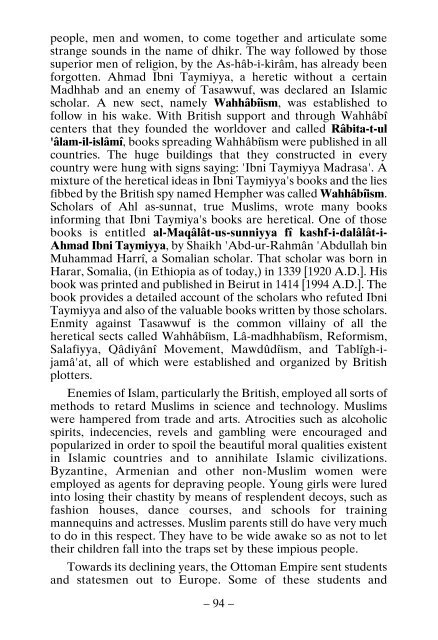Confessions Of A British Spy
Muhammad of Najd was the sort I had been looking for. For his scorn for the time’s scholars, his slighting even the (earliest) four Khalîfas, his having an independent view in understanding the Qur’ân and the Sunna were his most vulnerable points to hunt and obtain him. So different this conceited youngster was from that Ahmed Efendi who had taught me in Istanbul! That scholar, like his predecessors, was reminiscent of a mountain. No power would be able to move him. Whenever he mentioned the name of Abû Hanîfa, he would stand up, go and make an ablution. Whenever he meant to hold the book of Hadîth named he would, again, make an ablution. The Sunnîs trust this book very much. Muhammed of Najd, on the other hand, disdained Abû Hanîfa very much. He would say, “I know better than Abû Hanîfa did. In addition, according to him, half of the book of wrong.
Muhammad of Najd was the sort I had been looking for. For
his scorn for the time’s scholars, his slighting even the (earliest)
four Khalîfas, his having an independent view in understanding
the Qur’ân and the Sunna were his most vulnerable points to hunt
and obtain him. So different this conceited youngster was from
that Ahmed Efendi who had taught me in Istanbul! That scholar,
like his predecessors, was reminiscent of a mountain. No power
would be able to move him. Whenever he mentioned the name of
Abû Hanîfa, he would stand up, go and make an ablution.
Whenever he meant to hold the book of Hadîth named he would, again, make an ablution. The Sunnîs trust this book
very much.
Muhammed of Najd, on the other hand, disdained Abû Hanîfa
very much. He would say, “I know better than Abû Hanîfa did.
In addition, according to him, half of the book of wrong.
You also want an ePaper? Increase the reach of your titles
YUMPU automatically turns print PDFs into web optimized ePapers that Google loves.
people, men and women, to come together and articulate some<br />
strange sounds in the name of dhikr. The way followed by those<br />
superior men of religion, by the As-hâb-i-kirâm, has already been<br />
forgotten. Ahmad Ibni Taymiyya, a heretic without a certain<br />
Madhhab and an enemy of Tasawwuf, was declared an Islamic<br />
scholar. A new sect, namely Wahhâbîism, was established to<br />
follow in his wake. With <strong>British</strong> support and through Wahhâbî<br />
centers that they founded the worldover and called Râbita-t-ul<br />
'âlam-il-islâmî, books spreading Wahhâbîism were published in all<br />
countries. The huge buildings that they constructed in every<br />
country were hung with signs saying: 'Ibni Taymiyya Madrasa'. A<br />
mixture of the heretical ideas in Ibni Taymiyya's books and the lies<br />
fibbed by the <strong>British</strong> spy named Hempher was called Wahhâbîism.<br />
Scholars of Ahl as-sunnat, true Muslims, wrote many books<br />
informing that Ibni Taymiya's books are heretical. One of those<br />
books is entitled al-Maqâlât-us-sunniyya fî kashf-i-dalâlât-i-<br />
Ahmad Ibni Taymiyya, by Shaikh 'Abd-ur-Rahmân 'Abdullah bin<br />
Muhammad Harrî, a Somalian scholar. That scholar was born in<br />
Harar, Somalia, (in Ethiopia as of today,) in 1339 [1920 A.D.]. His<br />
book was printed and published in Beirut in 1414 [1994 A.D.]. The<br />
book provides a detailed account of the scholars who refuted Ibni<br />
Taymiyya and also of the valuable books written by those scholars.<br />
Enmity against Tasawwuf is the common villainy of all the<br />
heretical sects called Wahhâbîism, Lâ-madhhabîism, Reformism,<br />
Salafiyya, Qâdiyânî Movement, Mawdûdîism, and Tablîgh-ijamâ'at,<br />
all of which were established and organized by <strong>British</strong><br />
plotters.<br />
Enemies of Islam, particularly the <strong>British</strong>, employed all sorts of<br />
methods to retard Muslims in science and technology. Muslims<br />
were hampered from trade and arts. Atrocities such as alcoholic<br />
spirits, indecencies, revels and gambling were encouraged and<br />
popularized in order to spoil the beautiful moral qualities existent<br />
in Islamic countries and to annihilate Islamic civilizations.<br />
Byzantine, Armenian and other non-Muslim women were<br />
employed as agents for depraving people. Young girls were lured<br />
into losing their chastity by means of resplendent decoys, such as<br />
fashion houses, dance courses, and schools for training<br />
mannequins and actresses. Muslim parents still do have very much<br />
to do in this respect. They have to be wide awake so as not to let<br />
their children fall into the traps set by these impious people.<br />
Towards its declining years, the Ottoman Empire sent students<br />
and statesmen out to Europe. Some of these students and<br />
– 94 –


